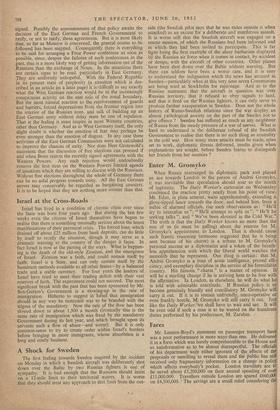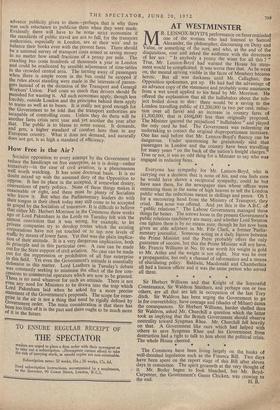Fares
Mr. Lennox-Boyd's statement on passenger transport fares was a poor performance in more ways than one. He delivered it in a form which was barely comprehensible to the House and so uninformative as to be almost disrespectful. The officials of his department were either ignorant of tbe, effects of the proposals or unwilling to reveal them and the public has still received only fragmentary information on a change in policy which affects everybody's pocket. London travellers are to be saved about £1,200,000 on their annual spending of ovet £11,000,000. Travellers outside London are spared £660,000 on £4,500,000. The savings are a small relief considering the advance publicity given to them—perhaps that is why there was such reluctance to publicise them when they were made. Evidently, there will have to be some strict economies if the standards of public travel are not to fall, for the transport authorities, especially in London, are at their wits' end to balance their books even with the present fares. There should be a national survey of transport costs aimed at saving money in no matter how small fractions of a penny per mile. The crawling bus costs hundreds of thousands a year in London and could be eradicated by sensible adjustment of time-tables in the crowded central area. The turning away of passengers when there is ample room in the bus could be stopped if the rules about standing were made in the interests of passen- gers instead of at the dictation of the Transport and Generpl Workers' Union. Fuel costs so much that drivers should be punished for wasting it. All such economies apply, though less forcibly, outside London and the principles behind them apply to trains as well as to buses. It is really not good enough for the Government to be told that the transport authorities are incapable of controlling costs. Unless they do there will be another fares crisis next year and yet another the year after .that. The public is to blame to some extent. It demands, and gets, a higher standard of comfort here than in any European country. What it does not demand, and naturally does not get, is as high a standard of efficiency.



















































 Previous page
Previous page